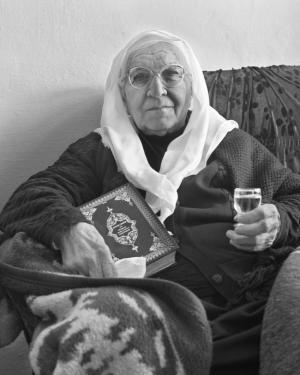Fighting Nazis, Middle Eastern and Islamic Style

August 14, 2017
We were all troubled, like many Americans and concerned citizens across the globe, by the images we saw coming from Charlottesville, VA. In CMES, we teach classes on the modern Middle East, and how WWII profoundly affected the region, whose countries became actual battlefields (especially in North Africa) and whose elites were influenced by the competing ideologies of democracy, social democracy, socialism, communism, fascism and Nazism.
Much has been written on Middle Eastern and Muslim leaders who sought collaboration with the Axis powers, partly mesmerized by Germany's speedy economic and military recovery under Hitler and partly believing that "the enemy of my enemy is my friend," namely that collaboration of Arabs and Muslims with the Germans and the Italians would help Arabs and Muslims fight British and French colonialism and imperialism.
However, in recent years, a new wave of scholars has underscored the significance of groups who resisted fascism and Nazism in the Middle East. Who were these groups? Some were democrats and liberals who feared the Nazis' disregard for human life and human rights. Since part of the Middle Eastern elites were educated in France, many intellectuals bemoaned its fall, the humane cultures it represented, and the bleak future that anticipated Europe after its occupation by Germany. Arab intellectuals also reminded readers that German anti-Semitism was directed against Arabs as well. It continued a long tradition where Arab writers took pride in their Semitic origins and Semitic contribution to world civilization. Egyptian writers in particular, terrified by the conquest of Ethiopia by Fascist Italy, feared that they were next in line. The 1930s and 1940s marked the rise of the Arab left and many an Arab socialist and communist condemned the German regime, especially after the entry of the USSR to the war. There was also a political camp that still supported collaboration with the French and British and many other Arab writers who argued that it would be a fatal mistake to replace the older colonialism with the much more horrid form of German and Italian colonization.
Finally, Muslim scholars, Sunni and Shi'i alike, argued that Fascism and Nazism were inherently contradictory to Islam. These Western regimes and ideologies, with their deifying the state, with the preference their leaders and ideologues gave to ethnicity and purity of blood over ethics, with their admiration of power, and with their conquest of Muslim subjects in the name of racial superiority, contradicted the Islamic religion whose foundations centered on the unity of God, underlined the preference of faith over ethnicity, and celebrated mercy and compassion. Scholars have likewise documented the many Muslims, in North Africa, Albania, Turkey, and Iraq, as well as the foreign Egyptian, Palestinian, Iranian and Turkish diplomats and subjects residing in Europe, who provided help to Jews fleeing death. Such behavior gives us much hope in this day and age.
Orit Bashkin
Professor of Modern Middle Eastern History
Director, Center for Middle Eastern Studies
For Further Reading
ONLINE RESOURCES
On Palestinian views, and on the Palestinian leftist Najati Sidqi, his involvement in the Spanish Civil War and anti-Fascist activities:
- "Did the Muslim World Really Fall for Hitler" by John Broich [Slate]
- "The Enigmatic Jerusalem Bolshevik: The Memoirs of Najati Siqi" by Salim Tamari [Institute for Palestine Studies]
- "Palestinians and the Syrian Revolution: Lessons from the fight against fascism" by Talal Alyan [+972]
Israel Gershoni and James Jankowsky on Egypt:
- "Narratives of Modern Egyptian History" Introduction from Confronting Fascism in Egypt: Dictatorship versus Democracy in the 1930s
Diplomats and Muslim subjects in Europe who assisted Jews:
- "Righteous Among the Nations: Muslims Who Saved Jews from the Holocaust" by Tim Townsend [Huffington Post]
- "The 'Other' Righteous Gentiles: Muslims" by Richard Silverstein [Tikun Olam]
Iran:
- "The 'Iranian Schindler' who saved Jews from the Nazis" by Brian Wheeler [BBC News]
- "Remembering the Muslim 'Schindlers' Who Saved Jews From the Nazis" by Avital Chizhik-Goldschmidt [Haaretz]
- "Sardari, the Iranian Muslim Who Saved Jews from the Holocaust" by Shima Shahrabi [IranWire]
Turkey:
- "True courage of one who had to act" [The Telegraph]
- Selahattin Ülkümen (1914 - 2003) one of the Righteous Among the Nations, Yad Vashem
Egypt:
- "Yad Vashem Names Egyptian First Arab Righteous Among the Nations" by Ofer Aderet [Haaretz]
Albanians who saved Jews in Europe:
- "Besa: A Code of Honor - Muslim Albanians Who Rescued Jews During the Holocaust" [Yad Vashem]
- "Destan and Lime Balla" [Yad Vashem]
Armenians who saved Jews:
- "Armenian Righteous Among the Nations" [Yad Vashem]
- List of Armenian Righteous Among the Nations honored by Yad Vashem as of January 1, 2017
On the Farhud:
BOOKS
The following books provide information about resistance to Fascism and Nazism across North Africa and the Middle East
- Arab World: Arab Responses to Fascism and Nazism: Attraction and Repulsion edited by Israel Gershoni, University of Texas Press, 2014
- North Africa: Among the Righteous: Lost Stories from the Holocaust's Long Reach into Arab Lands by Robert Satloff, PublicAffairs, 2007
- Palestine: Memoirs of Najati Sidqi (1905-1979) introduced and compiled by Hanna Abu Hanna, Institute for Palestine Studies, 2001
- Egypt: Confronting Fascism in Egypt: Dictatorship versus Democracy in the 1930s by Israel Gershoni and James Jankowski, Stanford University Press, 2009
- Syria: Nazism in Syria and Lebanon: The Ambivalence of the German Option, 1933-1945 by Götz Nordbruch, Routledge, 2009
- Turkey: Turkey and the Holocaust: Turkey’s Role in Rescuing Turkish and European Jewry from Nazi Persecution, 1933–1945 by Stanford J. Shaw, Palgrave Macmillan UK, 1993
 THE UNIVERSITY OF CHICAGO
THE UNIVERSITY OF CHICAGO

